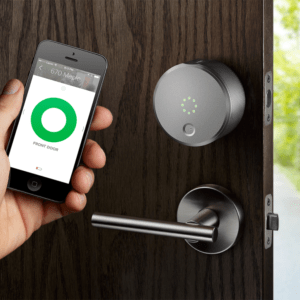Smart Locks Review
Buying Smart Locks

August Smart Lock
The popularity of Bluetooth has extended to locks on our front doors, but are they as safe as they sound? With many consumers, especially the Millennials, love for new gadgets the cell phones have become an integral part of our daily routines. From adjusting the climate control, turning the lights on or off to locking and unlocking the doors, today’s homeowners could adjust many functions in their homes remotely from anywhere in the world through their mobile devices. This convenience at times has resulted in the expense of the safety, leaving the properties vulnerable to hack by many hackers.
In a recent hackers convention, Def Con, two researchers from Merculite Security put 16 smart locks to test to try to hack and open them. Apparently, the weak link is in the Bluetooth transmission of commands and passwords from homeowners to the locks. Some of the transmissions were in text instead of encryption while passwords were easily stolen through Bluetooth sniffers on others. The locks communicating through simple texts with the App are proven to be the most vulnerable. The example of these locks are:
- Quicklock Doorlock
- Quicklock Padlock
- iBlulock Padlock
- Plantraco Phantomlock
For more details and the list of the locks that the researchers could not hack please visit the Def Con Report on Picking Bluetooth Locks

